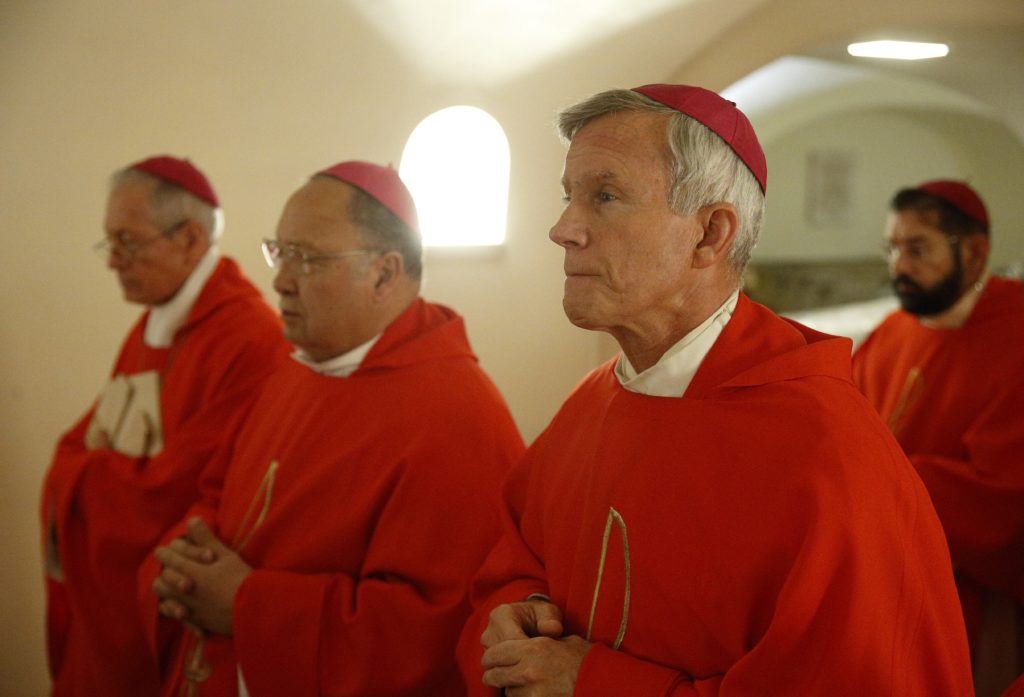The removal of Bishop Joseph E. Strickland from pastoral governance of the Diocese of Tyler, Texas, is an administrative rather than penal action, a canon law scholar told OSV News.
On Nov. 11, the Holy See Press Office announced the bishop was removed by Pope Francis from the pastoral governance of the diocese. The pope has appointed Bishop Joe S. Vásquez of Austin, Texas, as apostolic administrator to oversee the diocese until a new bishop is appointed.
No reason was given for Bishop Strickland's removal, although speculation about his future in the diocese has swirled for months given a number of statements the bishop had made challenging the pope's orthodoxy and authority.
Now, Bishop Strickland is "functionally a retired bishop" who remains incardinated in his diocese, said Father John Beal, professor of canon law at The Catholic University of America.
The removal "does not affect his ability to function as a bishop in the spiritual realm, at least thus far," said Father Beal. "There's been nothing said otherwise, so they would have to make it public if they were going to limit his spiritual ministry."
Father Beal added that "the removal does not, of itself, entail any wrongdoing."
"It's just … a pastoral judgment that the ministry had become detrimental or ineffective in that particular place," he told OSV News Nov. 12.
In addition, "it's important to distinguish … between the penal privation or deposition of a bishop for a canonical delict or crime, and the administrative removal," he said.
The penal privation "has a long lineage going back to the early church, where a bishop was accused of some wrongdoing," he said. "Often in the early church it was heresy, and they were removed."
After the 11th-century Gregorian Reform -- led by Pope Gregory VII, who sought to address the issues of simony, canonical elections and clerical celibacy -- the removal process "started to become something that the pope was actively involved in," Father Beal said.
Following the Gregorian Reform, "the popes would send out papal legates to the hinterlands to enforce the reform measures and call synods where accusations could be made and people could be deposed," he said.
Over the last millennium, the penal deposition or privation of the office of bishop, "like other loss of offices for (canonical) crimes, has been done through a penal process -- a judicial process where the pope is the ultimate judge, although he usually delegates somebody else to do it for him," said Father Beal. "That has a long history, and there's a clear procedure to follow."
The administrative removal is a more recent development in church history, said Father Beal, who noted the procedure is used to address cases "when someone's ministry has become detrimental or ineffective."
Father Beal said the administrative removal of pastors for such reasons was not instituted until 1910. The current procedure is laid out in canons 1740-1752.
"With pastors, there's a clear process to follow," said Father Beal.
However, "with bishops, it's up to the Holy See -- the pope, ultimately -- and the Dicastery for Bishops to determine the process," he said.
"Usually it is preceded by an apostolic visitation, where people appointed by the dicastery, usually other bishops, go to the diocese in question and interview or take testimony from people -- including the bishop himself -- and render a report," Father Beal said. "And then there is a decision based on that."
Father Beal said the apostolic visitation to the Diocese of Tyler -- which took place June 19-24 and which was conducted by retired Bishop Gerald F. Kicanas of Tucson, Arizona, and Bishop Dennis J. Sullivan of Camden, New Jersey -- "(seemed) to have followed the usual format," based on "what has been made known publicly."
If a decision is made that a bishop's ministry "has become detrimental or ineffective," he is "encouraged to resign," said Father Beal.
Bishop Strickland was asked to resign Nov. 9, but he declined to do so, and so Pope Francis removed him from his office, according to a public statement released Nov. 11 by Cardinal Daniel N. DiNardo of Galveston-Houston, the metropolitan archbishop of the ecclesiastical province that includes the Tyler Diocese.
That decision is "a pastoral judgment on the part of the pope, ultimately," said Father Beal. "I don't know that they have a process with criteria. If there is, it's not been published, and so it's not available to canon lawyers to critique."
Father Beal said the Canon Law Society of America had published a 1989 study on "making the process for these determinations public," with suggestions for "a future process," but to date the study's findings have not been implemented.
Doing so would help "eliminate some of the innuendo and suspicion of arbitrariness," adding that "supposed arbitrariness is almost as bad as the real thing," said Father Beal.
Adoption of a future process would depend upon the bishops, he said, noting that the task is "not a top priority.
"Although, when something like (Bishop Strickland's removal) happens, it may get their attention," he said.

